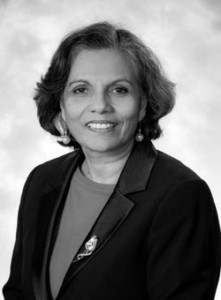Professor Sarojni Choy is dedicated to the lifelong learning practices and professional development of adults through innovative workplace learning strategies.
 Hailing from Fiji, Sarojni was a ‘70s alumnus of the University of the South Pacific (USP). Sarojni is the first female from her Island of Vanua Levu to become a professor and she is the first and only person in her family to hold a PhD.
Hailing from Fiji, Sarojni was a ‘70s alumnus of the University of the South Pacific (USP). Sarojni is the first female from her Island of Vanua Levu to become a professor and she is the first and only person in her family to hold a PhD.
Sarojni was a high school science and mathematics teacher in her home country, however career opportunities brought her and her family to Australia in the early 90s.
She completed an undergraduate and Masters of Education (Research) degree in Australia. Immediately upon completion of this, she was offered an Australian Postgraduate Award to complete a PhD in youth learning. About her PhD, Sarojni says:
“I looked at the kinds of pedagogies that are more appropriate for youth learners and that not all aspects of adult learning theories were appropriate for young people. I came up with some new principles for youth learners.”
Sarojni transitioned into the VET sector when she arrived in Australia.
Sarojni has extensive experience in professional development and is currently the Program Director for the Masters of Learning and Development at Griffith. The program is designed to develop a critical mass of adult educators who are engaged in transforming Singapore’s national strategy on continuing education and training. This programme has been sponsored by the Singapore Government since 2011. About her work, she says:
“The diversity of students is a nice challenge and makes the teaching very interesting. A class of 30 students could have up to 15-18 different industry backgrounds. They come with rich sets of knowledge and experiences in their own fields, so integrating that with what I teach brings new kinds of understandings and practicality. The delivery approach is very enriching for the learning cohorts in terms of co-learning opportunities.”
Sarojni has recently completed a project on enhancing the standing of vocational education through school partnerships, with industries and communities. This research team, comprising three other GIER researchers, have recently had a book published “The Standing of Vocational Education and the Occupations it Serves.”
The second project, funded by an ARC grant, is researching lifelong learning for adults and the kinds of provisions needed at different phases of people’s working life. This project is using a life history methodology, which Sarojni says she has not used before, but finds very interesting.
A third project, also funded by an ARC grant, is investigating the impact of digitisation and how professionals use digital technologies for learning in their workplace.
Sarojni says:
“Workplaces are authentic and very rich places for learning. The value of learning in the workplace and how workers learn is less recognized. It’s very important to create awareness of these opportunities. We are looking at how, from employees’ and employers’ perspectives, they can harness opportunities. If work and learning could be integrated, it would save a lot of time and greatly increase productivity.”
Sarojni is passionate about the work she does, especially contributing to helping change people’s lives.
“I like being able to help enhance people’s learning to extend opportunities for career choices. It’s rewarding to see how my graduates make an impact through their work, and how this flows onto others in their workplaces and countries. The cascading flow-on effect is very rewarding.”
Read more about Sarojni’s work on her expert’s profile and below:
 Collaborative communication between teachers and company supervisors for integrative teaching
Collaborative communication between teachers and company supervisors for integrative teaching



